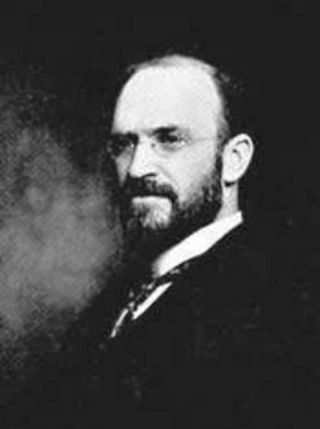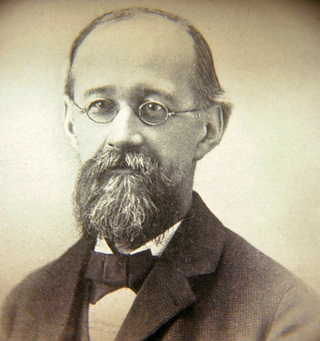Related Research Articles
The Bliss bibliographic classification (BC) is a library classification system that was created by Henry E. Bliss (1870–1955) and published in four volumes between 1940 and 1953. Although originally devised in the United States, it was more commonly adopted by British libraries. A second edition of the system (BC2) has been in ongoing development in Britain since 1977.
The Cutter Expansive Classification system is a library classification system devised by Charles Ammi Cutter. The system was the basis for the top categories of the Library of Congress Classification.

The Dewey Decimal Classification (DDC), colloquially known as the Dewey Decimal System, is a proprietary library classification system which allows new books to be added to a library in their appropriate location based on subject. It was first published in the United States by Melvil Dewey in 1876. Originally described in a 44-page pamphlet, it has been expanded to multiple volumes and revised through 23 major editions, the latest printed in 2011. It is also available in an abridged version suitable for smaller libraries. OCLC, a non-profit cooperative that serves libraries, currently maintains the system and licenses online access to WebDewey, a continuously updated version for catalogers.
The Library of Congress Classification (LCC) is a system of library classification developed by the Library of Congress in the United States, which can be used for shelving books in a library. LCC is mainly used by large research and academic libraries, while most public libraries and small academic libraries use the Dewey Decimal Classification system. The classification was developed by James Hanson, with assistance from Charles Martel, in 1897, while they were working at the Library of Congress. It was designed specifically for the purposes and collection of the Library of Congress to replace the fixed location system developed by Thomas Jefferson.

A library classification is a system used within a library to organize materials, including books, sound and video recordings, electronic materials, etc., both on shelves and in catalogs and indexes. Each item is typically assigned a call number, which identifies the location of the item within the system. Materials can be arrange by many different factors, typically in either a hierarchical tree structure based on the subject or using a faceted classification system, which allows the assignment of multiple classifications to an object, enabling the classifications to be ordered in many ways.

Library management is a sub-discipline of institutional management that focuses on specific issues faced by libraries and library management professionals. Library management encompasses normal managerial tasks, as well as intellectual freedom and fundraising responsibilities. Issues faced in library management frequently overlap with those faced in managing non-profit organizations.

Melville Louis Kossuth "Melvil" Dewey was an influential American librarian and educator, inventor of the Dewey Decimal system of library classification, a founder of the Lake Placid Club, and a chief librarian at Columbia University. He was also a founding member of the American Library Association. Although Dewey's contributions to the modern library are widely recognized, his legacy is marred by his sexual harassment of female colleagues, as well as his racism and antisemitism.

This page is a glossary of library and information science.

Charles Ammi Cutter was an American librarian. In the 1850s and 1860s he assisted with the re-cataloging of the Harvard College library, producing America's first public card catalog. The card system proved more flexible for librarians and far more useful to patrons than the old method of entering titles in chronological order in large books. In 1868 he joined the Boston Athenaeum, making its card catalog an international model. Cutter promoted centralized cataloging of books, which became the standard practice at the Library of Congress. He was elected to leadership positions in numerous library organizations at the local and national level. Cutter is remembered for the Cutter Expansive Classification, his system of giving standardized classification numbers to each book, and arranging them on shelves by that number so that books on similar topics would be shelved together.
This is a conversion chart showing how the Dewey Decimal and Library of Congress Classification systems organize resources by concept, in part for the purpose of assigning call numbers. These two systems account for over 95% of the classification in United States libraries, and are used widely around the world.

The following outline is provided as an overview of and topical guide to library and information science:
Library technical services are the ongoing maintenance activities of a library's collection, including the three broad areas of collection development, cataloging, and processing. Technical services are the infrastructure that enable the user's experience of many library services and are typically performed "behind the scenes."
The Korean Decimal Classification (KDC) is a system of library classification used in South Korea.

Charles Martel was an American librarian responsible for the creation of the Library of Congress Classification; he is often considered to be one of the most influential librarians in American library history.
Lois Mai Chan was an American librarian, author, and professor at the University of Kentucky School of Library and Information Science until 2011. Her publications on cataloging, library classification, and subject indexing were recognized with various awards.
Metis is a Dewey-free library classification system developed and implemented in 2011 by Sue Giffard, Tali Balas Kaplan, Jennifer Still, and Andrea Dolloff, the librarians at the Ethical Culture School in New York City. The system places the thinking, interests, information needs and information-seeking behavior of children at its center. It was developed as an alternative to the Dewey Decimal Classification System and the practices which customarily accompany that system in school and public libraries in the United States: namely, the alphabetical arrangement of fiction by author, and the frequent arrangement of biographies in alphabetical order by biographee. The Metis system was designed to encourage productive independent browsing by children, as well as allowing for successful catalog searching by elementary school students.
The British National Bibliography (BNB) was established at the British Museum in 1949 to publish a list of the books, journals and serials that are published in the United Kingdom and Republic of Ireland. It also includes information on forthcoming titles. This is the single most comprehensive listing of UK titles. UK and Irish publishers are obliged by legal deposit to send a copy of all new publications, including serial titles, to the BNB for listing. The BNB publishes the list weekly in electronic form: the last printed weekly list appeared in December 2011.
The Brian Deer Classification System (BDC) is a library classification system used to organize materials in libraries with specialized Indigenous collections. The system was created in the mid-1970s by Canadian librarian A. Brian Deer, a Kahnawake Mohawk. It has been adapted for use in a British Columbia version, and also by a small number of First Nations libraries in Canada.
Evelyn May Seymour was an American librarian who collaborated closely with Melvil Dewey on the Dewey Decimal Classification (DDC). Seymour edited eight editions of the DDC.
The BISAC Subject Headings are a method to classify books that is geared towards bookstores. It is mainly used by the Northern American booktrade, and online sellers like Barnes & Noble, Amazon and Baker & Taylor. The Book Industry Study Group maintains the BISAC system.
References
- 1 2 3 4 Fister, Barbara I (2009). "The Dewey Dilemma". Library Journal. 134 (16): 22–25.
- ↑ Coffman, Steve (March 1998). "What if you ran your library like a bookstore?". American Libraries: 40–46.
- 1 2 3 Gibson, Marjorie (2011). "Innovative 21st Century Classification Schemes for Elementary School Libraries" (PDF). Feliciter. 57 (2): 48–61. Retrieved 13 June 2014.[ permanent dead link ]
- ↑ Hope, Olson (2001). "Sameness and difference: a cultural foundation of classification" (PDF). Library Resources and Technical Services. 45 (3): 117.
- 1 2 3 4 Kaplan, Tali Balas; Dolloff, Andrea K.; Giffard, Sue; Still-Schiff, Jennifer (28 September 2012). "Are Dewey's Days Numbered?: Libraries Nationwide Are Ditching the Old Classification System". School Library Journal.
- ↑ Searing, Susan E. (1992). "How Libraries Cope with Interdisciplinarity: The Case of Women's Studies". Issues in Integrative Studies. 10: 8.
- 1 2 Afolabi, M (1992). "Spiritual matters: Provision for independent African churches in general classification schemes". International Classification. 19 (4): 210–213.
- ↑ Iwuji, H.O.M. (1989). "Africana in LC and DD classification schemes: A need for an Africana scheme?". Journal of Librarianship and Information Science. 21 (1): 1–18. doi:10.1177/096100068902100101. S2CID 58001238.
- ↑ McConnell, Fraiser (13 August 1984). "Classification of Melanesia". Cataloging & Classification Quarterly. 5 (1): 53–60. doi:10.1300/J104v05n01_04.
- ↑ McConnell, Fraiser (10 May 1985). "Languages of Melanesia". Cataloging & Classification Quarterly. 5 (3): 57–66. doi:10.1300/J104v05n03_05.
- ↑ McConnell, Fraiser (2 October 1985). "Peoples of Melanesia". Cataloging & Classification Quarterly. 5 (4): 47–51. doi:10.1300/J104v05n04_04.
- ↑ Kua, Eunice (2004). "Non-Western Languages and Literatures in the Dewey Decimal Classification Scheme" (PDF). Libri. 54 (4): 256–265. doi:10.1515/libr.2004.256. S2CID 2049719.
- ↑ Beall, Julianne (2009). "Racially Mixed People, DDC Table 5 Ethnic and National Groups, and MARC 21 Bibliographic Format Field 083". Cataloging & Classification Quarterly. 47 (7): 657–670. doi:10.1080/01639370903112005. S2CID 53781753.
- ↑ Furner, Jonathan (2007). "Dewey Deracialized: A Critical Race-Theoretic Perspective". Knowledge Organization. 34 (3): 144–168. doi:10.5771/0943-7444-2007-3-144.
- ↑ Steinberg. "Classified women". Librarians for Social Change. 5.
- ↑ Wolf, S. "Sex and the single cataloger: New thoughts on some unthinkable subjects". In West, Celeste (ed.). Revolting librarians. San Francisco: Booklegger Press. pp. 39–44.
- ↑ Christensen, Ben (2011). "Interfiling Intersex: How Dewey Classifies Intersex in Theory and in Practice". In Greenblatt, Ellen (ed.). Serving LGBTIQ Library and Archives Users : Essays on Outreach, Service, Collections and Access. McFarland & Company. pp. 201–211. ISBN 978-0786448944.
- ↑ Martínez-Ávila, Daniel; San Segundo, Rosa; Olson, Hope A. (2014). "The Use of BISAC in Libraries as New Cases of Reader-Interest Classifications". Cataloging & Classification Quarterly. 52 (2): 137–155. doi:10.1080/01639374.2013.846284. S2CID 60876614.
- ↑ Lynch, Sarah N.; Mulero, Eugene (14 July 2007). "Dewey? At This Library With a Very Different Outlook, They Don't". New York Times.
- ↑ Lavallee, Andrew (20 July 2007). "Discord over Dewey". Wall Street Journal. Retrieved 13 June 2014.
- 1 2 Oder, Norman (15 November 2010). "In the Country of Anythink". Library Journal. 135 (19): 22.
- ↑ "Getting to Know the Glades". Darien Library. Archived from the original on 25 February 2014. Retrieved 13 June 2014.
- ↑ Gray, John; Mahoney, James (23 June 2012). "Nyack Library's Dewey Decimal Debate". Nyack News and Views. Retrieved 13 June 2014.
- ↑ McGowan, Cecilia (5 August 2014). "When Finding Picture Books Really Can Be Child's Play [presentation]". First Tuesdays. Washington State Library. Retrieved 12 August 2014.[ permanent dead link ]
- ↑ Morson, Ian; Perry, Mike (1982). "Two-Tier and Total: Stock Arrangement in Brent". Alternative Arrangement: New Approaches to Public Libraries Stock. London: Association of Assistant Librarians.
- ↑ Miller, Andrew (1992). "Alternative Arrangement in Glasgow City Libraries". Public Library Journal. 7 (5): 131–133.
- ↑ Hill, Nanci Milone (July–August 2010). "Dewey or Don't We?". Public Libraries. 49 (4): 20.
- ↑ Spiller, David (2000). Providing Materials for Library Users. London: Library Association Publishing. p. 75.
- ↑ Martinez Ávila, Daniel (2012). Information Retrieval with BISAC in Bookstore, Library, and Other Catalogs. School of Information Studies, UW-Milwaukee. Archived from the original on 26 November 2014. Retrieved 18 June 2014.
- ↑ Stauffer, Suzanne M. (Summer 2008). "Dewey - or Don't We - Classify?". Children & Libraries. 6 (2): 49–51.
- ↑ Scott, Jeff. "Doing it without Dewey: A Perry Branch Library Tour". Gather No Dust. Retrieved 13 June 2014.